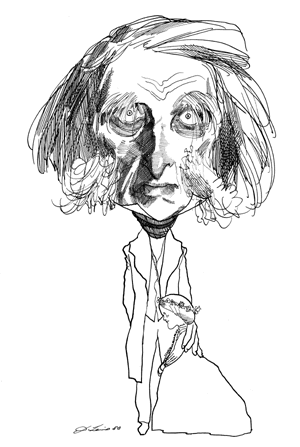Students of the nineteenth century tell stories of bonfires or of dusty attics, horror stories by which such things as Byron’s journal or Turner’s erotic drawings are lost forever or, less often, tales of lucky preservation. This edition of Rose La Touche’s diaries is an attic story and a bonfire story both.
It is a question whether the sexual peculiarity (from the modern point of view) of Victorians or just their enormous literary and epistolary output is more to be blamed for the bonfires conducted by their relations and literary executors, but it is safe to say that where there was a bonfire, anything that seemed sexually odd got burned. Luckily. Victorian heirs sometimes had different ideas than we have about oddness, and things were overlooked, for instance by the Gladstones. The passion of John Ruskin, nearly forty, for Rose La Touche, who was ten when they met, was embarrassing to his executors, who tried to erase her from the record of his life, but a number of traces of her have remained, in the letters and memoirs of their contemporaries, who unlike us had not, as Quentin Bell puts it, the “nasty twentieth-century habit of overturning screens.”
To us, Victorian pedophilia remains the least sympathetic of quirks, and we tend most to mind the self-deception with which they adored the beauty and “purity” of little girls (sometimes boys), seeming genuinely unconscious of the prurience so perfectly illustrated in Victorian photographs, by Lewis Carroll and other pedophiles, of nice little girls, brought thither presumably by their mothers, posed seductively in off-shoulder dresses, or showing fat little thighs, and pouting.
Conventional explanations, certainly borne out by the facts of Ruskin’s or Carroll’s life, include fear of adult sexuality, the need to separate “pure” from sexual love by focusing upon such sacred objects as mothers or innocent girls, and, in the case of Ruskin, madness, a battery of excuses sufficient to enable modern biographers to discuss what his first biographers—who combined a Victorian inclination to protect his good name with a modern uneasiness about the nature of his real feeling for Rosie—do their best to cover up.
Much Ruskin material was destroyed after his death, much more has disappeared, but by good luck these small fragments of Rose’s diaries were transcribed. Van Akin Burd’s admirable presentation of them combines narrative fascination with a considerable contribution to Ruskin biographical scholarship, and introduces two new characters—first, Rose herself, heretofore so shadowy, seen and not heard. Now she speaks for herself, if not on the subject of Ruskin, at least on subjects which interested her more. Hers is a frail, affecting document in the large literature of miserable Victorian childhood, testifying in particular to the misery of evangelical religion in the lives of sensitive children.
The other interesting character is Helen Gill Viljoen, a leading Ruskin scholar who until her death in 1974 was at work on what was to have been the major Ruskin biography, of which the prelude only (Ruskin’s Scottish Heritage) was published. It was Viljoen who discovered and copied the diaries, and left them, with other papers, with the present editors, Van Akin Burd, himself a notable Ruskin editor and scholar. Whether from some testamentary obligation or merely from the gracious good sense that characterizes his entire discussion of Ruskin and La Touche, Professor Burd tells us something of the history of Viljoen’s connection with the Ruskin estate, and of her character and career. The format of scholarly editions seldom allows for much discussion of the editorial and historical problems encountered in their production, let alone the character of the scholar, but since these are germane to the provenance of the diaries, his narrative seems justified as well as interesting.
The outlines of the story of Ruskin and Rose La Touche have long been known. The La Touches were an upper-class Anglo-Irish family whose father was a convert to evangelical religion and whose mother was concerned with culture, which led her to the acquaintance of Ruskin. Ruskin interested himself in Rose’s growth and development for a number of years, proposed marriage when Rose was eighteen and he was forty-six, and was to receive her answer (“no”) when she was twenty-one. The marriage was naturally opposed by her parents, who were concerned both by the difference in age and by Ruskin’s marital history.
Ruskin’s first marriage, never consummated, was annulled after six years on the grounds of his incurable impotence, a charge he did not deny at the time. Rose’s mother applied for advice to the first Mrs. Ruskin, now married to the painter Millais. Effie Millais replied that Ruskin was “quite unnatural,” and that he was probably not free to remarry, an opinion with which Mrs. La Touche’s solicitors agreed. If Ruskin were not impotent, the validity of the annulment might be called into question, and consequently the legitimacy of any subsequent marriages and children.
Advertisement
The anxiety and defensiveness felt by posterity about the sexual failures of public men are themselves very odd. One thinks of the furious attacks upon Froude which followed his revelations about Carlyle. In the case of Ruskin, the annulment of his marriage has engaged combatants into this century, defenders of Ruskin on the one hand, concerned to prove that he could have if he’d wanted to, and the descendants of Effie Millais on the other, concerned to uphold her actions in leaving Ruskin, suing for a decree of nullity and, eventually, replying as candidly as she did to the La Touches, candor which the Ruskinian party has ascribed to malice and blamed for ruining Ruskin’s chance of happiness. (Though it is hard to see what else she could have said.)
In any case, the question of marriage to Rose was then dropped, taken up, dropped again, and so on, and during these vicissitudes, Rose herself sickened and died, at the age of twenty-seven, of one of those vague Victorian maladies, a nervous affliction which biographers have loved to hint may have been owing to the strain of it all, but which sounds from her own description organic enough, and terrible. This was not the end of Ruskin’s life of affections—he would find another young girl, Kate Olander, to whom he proposed when he was nearly seventy—but it was a sad episode in a life filled with sad episodes.
A clear picture of the La Touches has been missing from Ruskin biography; they have been sketched in as mysterious and unsympathetic, perhaps only because of their rather unfortunate names, “Rose La Touche” so perfect for a blooming nymphet, and “Mrs. La Touche” so like the villainness of a novel by Henry James. Quentin Bell has summed up the prevailing view of Rose as “sickly, distrustful, irresolute,” and “religious to the point of insanity,” while Mrs. La Touche has been presented as being in love with Ruskin herself, a nice Jamesian complication.
Ruskin died in 1900. His last home, Brantwood, in the Lake District, continued in the possession of Joan and Arthur Severn, cousins who had looked after him in his last years, but by 1929 they had died, and the house, still stuffed with manuscripts and papers, was unlived in and had fallen into disrepair. Helen Gill Viljoen, a young American scholar, obtained an introduction to a Severn daughter who gave her the run of the place and encouraged her to make copies of material which was soon to be sold, in particular Ruskin’s diaries; while occupied at this, Viljoen writes that “tucked away behind a lot of books on a top shelf I unearthed …certainly the missing diaries, and a bound volume of family papers…letters written by Ruskin to people concerned with Rose La Touche,” and, she would say later, “an autobiography of the immeasurably pathetic Rose.” These papers had, remarkably, escaped the “holocaust” advised by Ruskin’s executors, mainly Charles Eliot Norton of Harvard, who, apprehensive of “vultures” of gossip “hovering over what they have long marked for their prey,” were concerned to destroy any trace of Rose, whose memory Ruskin had so elaborately preserved.
What escaped the first bonfires was put up for sale, and what was not sold, in a general auction of Ruskin’s effects and manuscripts at Brantwood, was “piled in the garden and burned,” including, presumably, Rose’s diaries. Van Akin Burd’s clear and delicate account of bonfires, cross-purposes, scholarly intrigue, misjudgment, and vanity, and his greatly enlarged and detailed account of the La Touches, are as absorbing as The Aspern Papers.
Burd’s introduction is 142 pages long, while the diaries occupy only thirty-nine pages. The first excerpt, written when Rose was thirteen, is of the regular thirteen-year-old kind:
The Louvre I thought most be-e-eautiful. Mr. Ruskin told us to look at the Titians. Well it’s no use trying to describe what they were and what I thought of them. I won’t attempt it.—I liked the statues just as well as the pictures. I can’t say much more than that the Venus Victrie is so perfectly lovely though her arms are broken off.
Her later diary, an attempt at auto-biography begun in an introspective mood at the time of her nineteenth birthday, is more remarkable, both for its affecting account of her physical sufferings during an early attack of the illness from which she would die, and for its clear description of the torments of conscience for a literal-minded and strictly brought up child in an evangelical household:
People should have been very careful, I think, about saying things were right if they knew what an impression it made upon me. Long before that I remember Mama or a nurse saying that one ought to sit or lie straight and for nights I used to torture myself in bed trying to lie on my back with my legs quite straight.
She also describes her experience of that peculiarly Victorian and, it would seem, unnecessary torment, Doubt. As a child of fourteen she was thrown into a long crisis of panic at overhearing discussions of the Higher Criticism, “more pains taken by them how all might be false, than how the whole thing I lived by might be true,” and at night
Advertisement
I could not say my prayers, for the doubts and arguments I had listened to quietly in the daytime would come thronging into my head till they were but cries of despair…. In the morning things began again and even lessons were a relief…but when I came to read the Bible (a habit formed from my Father’s teaching, as regular as breakfast) all the night doubts arrived…. If the manuscripts were false, if they were not what they professed to be, what was the use of Faith—one could not believe a false thing….
Ruskin’s own judgment of Rose as a diligent girl of ordinary abilities reminds one of his view of Effie, a view largely accepted by biographers, as trivial and not very bright; neither is given much credit, but it is because Ruskin needs to see them as childlike and simple, and he sees them from his fiercely egocentric point of view. Of Rose he wrote approvingly that in her letters “there is not a sentence in which the child is thinking of herself. She knows exactly what I am thinking, and thinks only of that, without a shadow of vanity, or of impulsive egoism.” The vanity and egoism of such praise could have been uttered by The Egoist, Willoughby Patterne himself. Just as the amusing and acute letters of Effie Ruskin from Venice suggest her considerable wit and power, so does the bitter perspicacity of Rose’s self-analysis suggest a more interesting mind than it was given to Ruskin to understand.
This Issue
May 15, 1980




